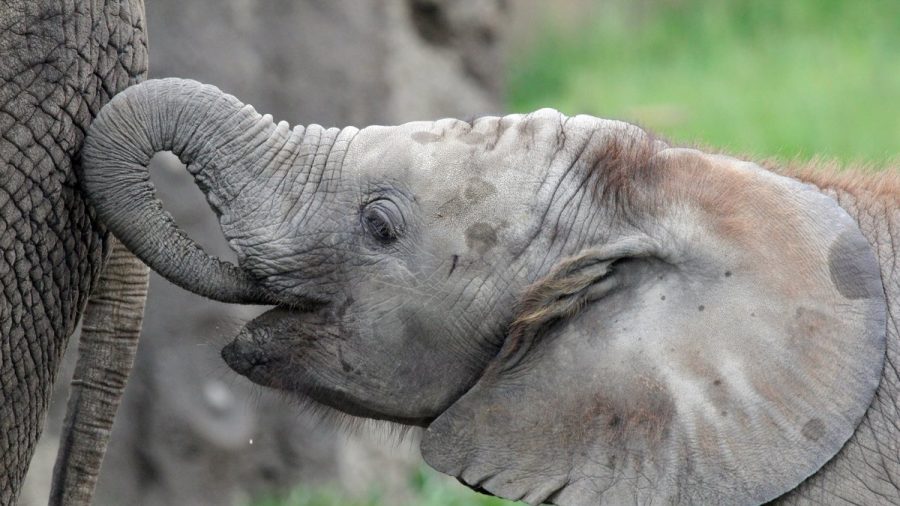A second elephant has died from an illness at the Indianapolis Zoo, officials said on March 26.
Kalina, an 8-year-old African elephant, became ill on March 23 and passed away just before noon on Tuesday.
Early test results indicated that she died from elephant endotheliotropic herpes virus, also known as EEHV.
“On March 23, 8-year-old Kalina started showing symptoms similar to elephant Nyah, who died March 19 after a short illness,” the Indianapolis Zoo said in a statement. “While we are still awaiting all the histopathology results from Nyah, tests indicated high levels of elephant endotheliotropic herpes virus (EEHV).”
While zookeepers had tested all the elephants for the virus none had tested positive until now.
On March 23, 8-yr-old Kalina started showing symptoms similar to elephant Nyah, who died March 19 after a short illness. While we are still awaiting histopathology results from Nyah, tests indicated high levels of elephant endotheliotropic herpesvirus (EEHV). (2/5)
— Indianapolis Zoo (@IndianapolisZoo) March 26, 2019
EEHV is a type of herpesvirus that can cause fatal hemorrhagic disease in elephants. It is one of the most deadly viral infections in elephants worldwide but is most commonly found in Asian elephants. It occurs in elephants in the wild as well as those in human care. (3/5)
— Indianapolis Zoo (@IndianapolisZoo) March 26, 2019
“It is likely that many or all of our elephants have been EEHV carriers and have passed the virus onto their offspring or each other,” the Zoo said Tuesday.
Kalina’s death came seven days after Nyah, a 6-year-old African elephant, died from an illness believed to be EEHV.
“Nyah was a beautiful, fun and curious elephant, often seen following her big sister Zahara around. We know that elephants grieve and each elephant in the herd was with Nyah after she died today to help them understand why she will not be with them anymore,” the zoo stated.
Following the deaths, Dr. Rob Shumaker, president of the zoo, told reporters that staff members are taking precautions to monitor the remaining six elephants, including giving them antivirals.
We are very sad to announce that following a short illness, our six-year-old African elephant Nyah died late this morning. Nyah was born and raised at the Indianapolis Zoo and the staff who have cared for her are feeling her loss deeply. (1/4) pic.twitter.com/Ff7Vvs77lU
— Indianapolis Zoo (@IndianapolisZoo) March 19, 2019
According to the Smithsonian National Zoo, EEHV was first identified by Smithsonian scientists in 1995 following the death of a 16-month-old Asian elephant.
The virus affects elephants both in captivity and in the wild and has been responsible for about half of the deaths of young elephants in zoos in recent years.
Most strains of the herpes virus cause hemorrhagic disease.
“Herpesviruses are widespread in all vertebrate taxa, including humans. While herpesviruses are usually species-specific, they can affect closely related species. (EEHV does not pose a health risk to humans, though humans are host to their own strains of herpesviruses). All herpesviruses do share common some features. Once inside a host, the virus can go into a latent (hidden) phase after causing only mild symptoms or no signs of disease at all. Scientists do not yet know where in the body EEHV resides during the latent phase,” scientists stated.

“For reasons unknown, an elephant herpesvirus can come out of latency and circulate throughout the bloodstream, causing disease. This is the only time when a herpesvirus can be readily detected in blood samples. Reliable tests are not yet available to detect a latent infection. Most elephants are able to fight the virus and survive when it comes out of latency. Calves appear to be most susceptible to EEHV disease after they have been weaned, at a time when they are not protected by their mother’s antibodies,” they added.
As of now, no cure is available for the disease. Researchers are working on developing a vaccine to prevent the virus.
Current antiviral treatments can suppress the virus, and in some cases elephants have recovered if they’re diagnosed and treated early.


